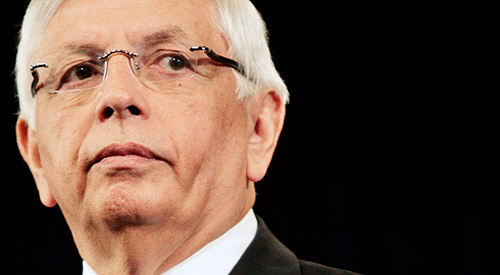
Stern: Driving the boat no more
One supposes that David Stern was going to have to retire eventually. He couldn’t be the NBA’s commissioner forever. But when it was announced he’d be retiring in early 2014, I was still caught off-guard. Stern, gone? Really?
I’ve never known the NBA without Stern. In some ways, Stern is the NBA to me. Save some apocalyptic disaster, the league will continue without him probably for some time. But a Stern-less NBA is something I’ve never quite thought about.
When I think about Stern, I think about him at the draft last June and how a rowdy crowd booed him constantly. Is he the most unlikeable commissioner in sports? He’s certainly more popular than Gary Bettman. And he’s actually more than a little likable; when he was booed, he held his hand up to his ear, feeding off it like the heel in a pro wrestling show.
What will his legacy be? That’s a tough, large and ill-defined question. Instead we should look at what he’s done: he was in charge just as the league started to blossom in popularity, brought in changes that helped make the sport more fun for the casual fan and been there as the NBA became a global league.
Does that make David Stern the most important figure in the NBA since 1984? That’s a big no: players like Magic Johnson, Larry Bird and especially Michael Jordan were more important. And in a sense, Stern’s NBA rode the crest of their successes.
[php snippet=1]
Remember, the NBA was in trouble in the early 1980s. Their playoff games were on tape-delay, broadcasted after midnight on CBS. Even as late as 1983, the NBA Finals were joined in progress by CBS. There was trouble on the teams, too. A 1981 Sports Illustrated story mentions a report that 80 percent of the NBA used cocaine. This was a league struggling against issues. The soaring popularity of Magic, Bird and Jordan dramatically helped out: the 1981 Finals pulled a 6.7 rating. Within a few seasons, it had doubled. By the mid 1990s, it had tripled, peaking at 18.7 in 1998.
But the league was popular during the regular season too: during the mid 1990s the NBA was getting a 5.0 share during the regular season, easily beating both the NHL and MLB.
But these numbers have dropped, for more than a few reasons: fragmentation in the TV market, a series of un-compelling teams (the San Antonio Spurs draw especially poorly) and, most important of all, the absence of compelling figures like Jordan. Ratings are only one measure, but they show the popularity of the NBA. But look at the TV deals the league has signed: the league receives about $930 annually from its TV deals.
It’s also worth noting Stern’s done a lot to clean up the NBA’s image: a strictly enforced dress code, hard suspensions for players getting physical and a near-masterful handling of Tim Donaghy’s gambling bombshell book. Indeed, it’s a credit to how well Stern runs the league that the scandal went away as quickly as it did. And look at his handling of the Malice in the Palace brawl: he suspended one player for essentially the whole season and has cracked down on anyone who gets overly physical during games, plus those who exaggerate contact, too.
Of everything that’s happened in the NBA since Stern assumed the commissioners role, a 2002 opening up of the rulebook is the biggest: a fundamental change to the way the NBA was played. It first slowed the game down (the mid 2000s Spurs and Pistons teams come to mind) but as coaches learned how to use a propulsive, forward-moving offense, like D’Antoni’s Seven Seconds Suns or the Nellieball Warriors, it became easier for casual fans to start watching. It’s hard to imagine players like Derrick Rose, Blake Griffin or Steve Nash thriving against the physical defenses from the years before.
Stern gets other accolades, too. Under him, the NBA thrived internationally. In 1992, the U.S. sent a Dream Team to the Summer Olympics. This team’s wild success – they won every game by a wide margin – is credited with fostering an international following for the NBA. Indeed, players like Manu Ginobili, Dirk Nowitzki and Pau Gasol have all said it inspired them.
But Stern sometimes gets too much credit for this. As McCallum notes in his book, Stern wasn’t exactly for pushing for it during the 1980s: “It wasn’t that the idea of NBA players in the Olympics slipped onto the NBA’s back burner; it wasn’t even on the stove.” It took years, and some prodding from organizations like the ABAUSA for it to happen.
Still, it’s more than just a case of right place, right time. Under Stern, the NBA’s gone to lengths for an international audience: they’ve played games in China and England. And the 2012 Finals were broadcast in 47 languages to over 200 countries. In this sense, Stern’s done the league a deal of good internationally.
This trifecta of international appeal, turnaround in ratings and opening up of the game is what should define Stern’s term as commissioner. He might not have personally saved the league, but under him the NBA’s survived lockouts, scandals and the retirement of it’s most famous player ever. And going into the 2012-13 season, it looks as healthy as it’s ever been. The NBA will continue once Stern is gone. With the way he’s run it, not even Gary Bettman could run it into the ground without a lot of effort.
[php snippet=1]

